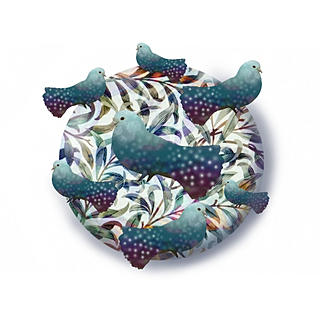As I delve deeper into the creation process for my upcoming solo exhibition, I'm spending a lot of time in the studio mixing and experimenting with colour. One combination that's been particularly captivating me lately is phthalo blue and titanium white.
It might sound simple, but the nuances you can achieve by carefully adjusting the ratios are incredible. From the most ethereal, sky-like washes to rich, deep ocean hues, understanding how these two pigments interact is helping me unlock the precise blues that resonate with the theme of my show and, more importantly, with my signature artistic style.
This process really highlights the importance of creating my own unique colour combinations. While pre-mixed tubes have their place, there's an unparalleled satisfaction and authenticity that comes from developing a palette that truly speaks to your artistic voice. Every brushstroke becomes an extension of that personal exploration.
I'm excited to share more of this journey with you all as the exhibition approaches. Stay tuned for glimpses into the finished pieces.

See less





